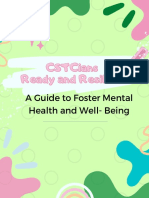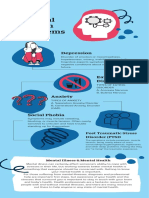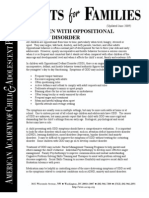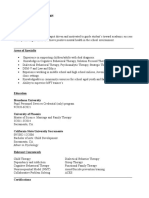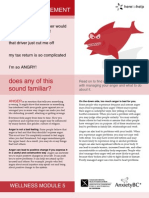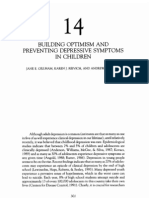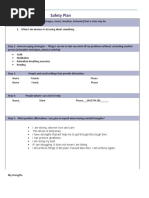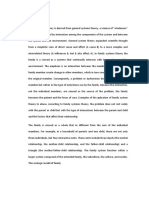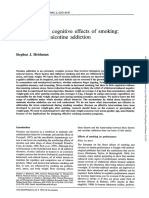Reading Activity 1-Coping With Alcoholic Parents
Reading Activity 1-Coping With Alcoholic Parents
Uploaded by
G BesasCopyright:
Available Formats
Reading Activity 1-Coping With Alcoholic Parents
Reading Activity 1-Coping With Alcoholic Parents
Uploaded by
G BesasOriginal Title
Copyright
Available Formats
Share this document
Did you find this document useful?
Is this content inappropriate?
Copyright:
Available Formats
Reading Activity 1-Coping With Alcoholic Parents
Reading Activity 1-Coping With Alcoholic Parents
Uploaded by
G BesasCopyright:
Available Formats
Kingfisher School of Business and Finance
Senior High School
Reading and Writing Skills
COPING with ALCOHOLIC PARENTS
Lots of people live with a parent or caregiver who is an alcoholic or who drinks too much.
Alcoholism has been around for centuries, yet no one has discovered an easy way to prevent it. Alcohol
can affect people’s health and the way they act. People who are drunk might be more aggressive or have
mood swings, they may act in a way that is embarrassing to them or other people.
Alcoholism is a disease. Like any disease, it needs to be treated. Without professional help, a
person with alcoholism will probably continue to drink and may even become worse over time. Diseases
like alcoholism are no one’s fault. Some people are more susceptible to wanting to drink too much.
Scientist think it has to do with genetics, as well as things like family history, and life events.
Sometimes, what starts as a bad habit can become a very big problem. For example, people may
drink to cope with problems like boredom, stress, or money troubles. Maybe there’s an illness in the
family, or parents are having marriage problems.
No matter what anyone says, people don’t drink because of someone else’s behavior. So if you
live with someone who has drinking problem, don’t blame yourself. If you live with a parent who drinks,
you may feel embarrassed, angry, sad, hurt, or any number of emotions. You may feel helpless. When
parents promise to stop drinking, for example, it can end in frustration when they don’t keep these
promises,
Problem drinking can change how families function. A parent may have trouble keeping a job and
problems paying the bills. Older kids may have to take care of younger siblings. Some parents with
alcohol problems might mistreat or abuse their children emotionally or physically. Others may neglect
their kids by not providing sufficient care and guidance. Parents with alcohol problems might also use
other drugs.
Despite what happens, most children of alcoholics love their parents and worry about something
bad happening to them. Kids who live with problem drinkers often try all kinds of ways to prevent them
from drinking. But, just as family members don’t cause the addiction, they can’t stop it either.
The person with the drinking problem has to take charge. Someone who has a bad habit or an
addiction to alcohol needs to get help from a treatment center. Alcoholism affects family members just
as much as it affects the person drinking. Because of this, there are lots of support groups to help
children of alcoholics cope with the problem.
Drinking too much can be a problem that nobody likes to talk about. In fact, lots of parents may
become enraged at the slightest suggestion that they are drinking too much. Sometimes, parents deny
that they have a problem. A person in denial refuses to believe the truth about a situation. So problem
drinkers may try to blame someone else because it is easier than taking responsibility for their own
drinking.
Some parents make their families feel bad by saying stuff like, “You’re driving me crazy!” or “I
can’t take this anymore.” That can be harmful, especially to kids. Most young children don’t know that
the problem has nothing to do with their actions and that it’s all in the drinker’s mind. Other parents do
acknowledge their drinking, but deny that it’s a problem. They may say stuff like, “I can stop anytime I
want to.” “Everyone drinks to unwind sometimes,” or “My drinking is not a problem.”
Lots of people fall into the trap of thinking that a parent’s drinking is only temporary. They tell
themselves that, when a particular problem is over, like having a rough time at work, the drinking will
stop. But even if a parent who drinks too much has other problems, drinking is a separate problem and
that problem won’t go away unless the drinker gets help.
If you’re like most teens, your life is probably filled with emotional ups and downs, regardless of
what’s happening at home. Add a parent with a drinking problem to the mix, and it can all seem like too
much. There are many reasons why a parent’s drinking can contribute to feelings of anger, frustration,
disappointment, sadness, embarrassment, worry, loneliness, and helplessness. For example:
You might be subjected to a parent’s changing moods. People who drink can behave
unpredictably. Kids who grow up around them may spend a lot of energy trying to figure out a
parent’s mood or guess that that parent wants. One day, you might walk on eggshells to
avoid an outburst because the dishes aren’t done or the lawn isn’t mowed. The next day, you
may find yourself comforting a parent who promises that thinks will be better.
It may be hard to do things with friends or other people. For some people, it feels like too
much trouble to have a friend over or do the things that everyone else does. You just never
know how your parent will act. Will your mom or dad show up drunk for school events or
drive you (and your friends) home drunk?
You might be stressed or worried. It can be scary to listen to adults in the house yell, fight, or
break things by accident. Worrying about a parent just adds to all the other emotions you
may be feeling. Are you lying awake waiting for your mom and dad to get home safely? Do
you feel it’s not fair that you have to be the grown up and take care of the things around the
house? These are all normal reactions.
Although each family is different, people who grow up with alcoholic parents often feel alone,
unloved, depressed, or burdened by the secret life they lead at home.
-http://kidshealth.org/teen/your_mind/families/coping_alcoholic.html
Answer the following questions:
1. What is alcoholism?
2. Why do people drink too much?
3. How does alcoholism affect families?
4. What do children experience when they grow up with an alcoholic parent?
5. What is the source of the article about alcoholism?
6. What happens is a parent doesn’t see alcoholism as a problem?
7. Can you do something to help an alcoholic friend? How?
8. Is it possible to give advice to parents involved in alcoholism?
9. Do you agree that parents can still function normally even if they’re into alcoholism? Why do
you say so?
10. What strategy would best work in dealing with an alcoholic parent?
11. Is there a long term side effect for this kind of domestic scenario?
You might also like
- Ideas For Teaching Children About EmotionsNo ratings yetIdeas For Teaching Children About Emotions11 pages
- The Peaceful Parent Anger Cleanse Week 02No ratings yetThe Peaceful Parent Anger Cleanse Week 0211 pages
- Health Reslience Lesson Plan - 2 X 45 Minute LessonsNo ratings yetHealth Reslience Lesson Plan - 2 X 45 Minute Lessons3 pages
- The Built Environment S Effect On LearningNo ratings yetThe Built Environment S Effect On Learning5 pages
- Coping Skills For Kids Grounding Your Body and MindNo ratings yetCoping Skills For Kids Grounding Your Body and Mind4 pages
- Coping Strategies For Better Mental HealthNo ratings yetCoping Strategies For Better Mental Health2 pages
- How Early Puberty Affects Childrens Mental HealthNo ratings yetHow Early Puberty Affects Childrens Mental Health4 pages
- 72 Children With Oppositional Defiant DisorderNo ratings yet72 Children With Oppositional Defiant Disorder2 pages
- Problem Solving Worksheet For Adults: PositivepsychologyNo ratings yetProblem Solving Worksheet For Adults: Positivepsychology2 pages
- PDSM-Self-Discovery and Lifelong Learning Notes100% (1)PDSM-Self-Discovery and Lifelong Learning Notes34 pages
- Anger Management: A Step By Step Instruction Handbook on How To Control and Manipulate Excessive Anger In A Healthy and Safe WayFrom EverandAnger Management: A Step By Step Instruction Handbook on How To Control and Manipulate Excessive Anger In A Healthy and Safe WayNo ratings yet
- A Social Thinking Guidebook For Teens E& Young Adults With - Asperger's, ADHD, PDD-NOS, NVLD, or Other Murky Undiagnosed SocialNo ratings yetA Social Thinking Guidebook For Teens E& Young Adults With - Asperger's, ADHD, PDD-NOS, NVLD, or Other Murky Undiagnosed Social218 pages
- Does Any of This Sound Familiar?: Anger ManagementNo ratings yetDoes Any of This Sound Familiar?: Anger Management4 pages
- Divorce and Separation Eced PresentationNo ratings yetDivorce and Separation Eced Presentation20 pages
- REACH Forgiveness 2 Hour Workbook EnglishNo ratings yetREACH Forgiveness 2 Hour Workbook English59 pages
- (Essential Issues Set 4) Melissa Higgins - Teen Self-Injury-ABDO Publishing Company - ABDO Publishing - Essential Library (2014)No ratings yet(Essential Issues Set 4) Melissa Higgins - Teen Self-Injury-ABDO Publishing Company - ABDO Publishing - Essential Library (2014)114 pages
- 7 Podcasts That Will Accelerate Your Learning100% (1)7 Podcasts That Will Accelerate Your Learning10 pages
- Safety Plan: 1. When I Am Anxious or Stressing About SomethingNo ratings yetSafety Plan: 1. When I Am Anxious or Stressing About Something2 pages
- Dokumen - Pub - 12 Essential Insights For Emotional Sobriety Getting Your Recovery Unstuck 12 Series 9781955415125 1955415129100% (1)Dokumen - Pub - 12 Essential Insights For Emotional Sobriety Getting Your Recovery Unstuck 12 Series 9781955415125 1955415129284 pages
- Family Systems Theory Is Derived From General Systems TheoryNo ratings yetFamily Systems Theory Is Derived From General Systems Theory3 pages
- The Five Love Languages Really: More: 10 Relationship Podcasts Everyone Should Listen ToNo ratings yetThe Five Love Languages Really: More: 10 Relationship Podcasts Everyone Should Listen To2 pages
- Kingfisher School of Business and Finance: Business Communication 10 Midterm Examination Reading and Writing SkillsNo ratings yetKingfisher School of Business and Finance: Business Communication 10 Midterm Examination Reading and Writing Skills1 page
- Behavioral and Cognitive Effects of Smoking: Relationship To Nicotine AddictionNo ratings yetBehavioral and Cognitive Effects of Smoking: Relationship To Nicotine Addiction5 pages
- Journal: Instagram Influencer Effects On MoodNo ratings yetJournal: Instagram Influencer Effects On Mood4 pages
- The Influence of Emotions On Impulsive Buying Behavior in The PRNo ratings yetThe Influence of Emotions On Impulsive Buying Behavior in The PR71 pages
- Final Assignment (TSL015) : Name: Muhammad Haikal Bin Amran Group: T12 STUDENT ID: 2019221002No ratings yetFinal Assignment (TSL015) : Name: Muhammad Haikal Bin Amran Group: T12 STUDENT ID: 201922100212 pages
- Get Emotion Science Cognitive and Neuroscientific Approaches to Understanding Human Emotions 2008th Edition Elaine Fox free all chapters100% (14)Get Emotion Science Cognitive and Neuroscientific Approaches to Understanding Human Emotions 2008th Edition Elaine Fox free all chapters81 pages
- Infinity Thinking Final Paper v12 2-20-2006No ratings yetInfinity Thinking Final Paper v12 2-20-200626 pages
- Running Free: Embracing A Healthy Lifestyle Through Distance RunningNo ratings yetRunning Free: Embracing A Healthy Lifestyle Through Distance Running9 pages
- Group 3 (Assignment) - Organisational Behavior.... FinalNo ratings yetGroup 3 (Assignment) - Organisational Behavior.... Final9 pages
- Tourism Information and Pleasure MotivationNo ratings yetTourism Information and Pleasure Motivation21 pages










